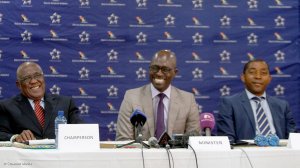Finance Minister Malusi Gigaba has promised that there will be a clear delineation of the roles of the shareholder, the board and the CEO at embattled national carrier South African Airways (SAA), following the constitution of the new board on November 3 and the appointment of Vuyani Jarana as the State-owned company’s first permanent CEO since 2015.
Previous board chairperson Dudu Myeni has been accused of having overreached into areas of executive responsibility during her controversial tenure at the airline. She has since been replaced by JB Magwaza, who stressed on Tuesday that any blurring of responsibilities was a “formula for chaos, or a ‘gemors’, to use the Afrikaans expression”.
Addressing the media following the board’s first formal meeting at Airways Park, Gigaba promised that Jarana had been given the power to lead the turnaround of the airline, which recently received a highly contested R10-billion injection from the National Treasury to stabilise the business as a going concern.
The first R5.2-billion was transferred to SAA in July after Standard Chartered and Citi Bank refused to renew loan facilities valued at R2.8-billion and R1.9-billion respectively. The R4.8-billion balance would be paid in R1-billion tranches during November, December and January, with the residual payment to be made before the end of March 2018.
The National Treasury is in the process of identifying State assets, including some at SAA itself, to fund the injection. However, Gigaba indicated in his Medium-Term Budget Policy Statement that government would sell a portion of its 39% holding in Telkom to fund the bail-out.
As part of the bail-out conditions, the SAA board need to deliver a cost-containment plan to Gigaba next month, as well as proposals on what assets could be sold in the short-term to help shore up the airline’s balance sheet.
It has also been agreed that the State’s airline assets – SAA, Mango and South African Express (SAX) – should be consolidated and that a strategic equity partner (SEP) be sought to inject both capital and expertise into the new entity.
No timeframe has been given for either the consolidation, or for securing an SEP, but Gigaba reports that an inter-Ministerial committee will be established to oversee the consolidation process.
Work is being pursued in parallel to define the nature of the SEP transaction, including what percentage of SAA will be sold. Once the SEP framework has been decided, a request for proposal will be issued.
“We still need to establish a roadmap towards that decision.”
The Minister stresses, though, that no wholesale privatisation is being considered, owing to the strategic nature of SAA. He also insists that there is interest in SAA not only from other airline operators, but also financial institutions and investment companies.
No non-negotiable constraints had been imposed on either the board or the executive in delivering the short-term turnaround, but a decision to cut back on staff would be taken as a “last resort”.
Besides cost containment, the new leadership team intends accelerating a review of SAA’s route network, pursuing ahead with revenue enhancements initiatives and building the executive capacity required to oversee the financial stabilisation of the business.
Jarana says his first priority is to fill the current executive vacancies with individuals able to improve the commercial performance of the airline.
The new CEO outlines a five-pillar strategy, including: liquidity management; balance-sheet restructuring; revenue stimulation, with a strong focus on growing ancillary revenues; cost containment; and a review of the corporate strategy, with an emphasis on developing a profitable route network supported by a fit-for-purpose fleet.
In his engagements with staff since taking up the position on November 1, Jarana says he has discovered a "willingness by the people of SAA to really, really work hard" to turn the airline into a sustainable business.
To deal with past transgressions at the enterprise, however, criminal charges could be laid against employees identified in three forensic reports as having broken the law. However, Magwaza says there is no intention to continually “look into the rear-view mirror”.
“We are at the brink. We either fall over, or we take steps back from the brink. For us as the board, its back from the brink and it has to be pretty soon and pretty smart,” Magwaza adds.
EMAIL THIS ARTICLE SAVE THIS ARTICLE ARTICLE ENQUIRY
To subscribe email subscriptions@creamermedia.co.za or click here
To advertise email advertising@creamermedia.co.za or click here










